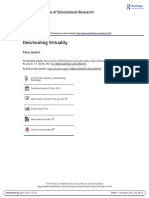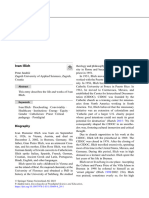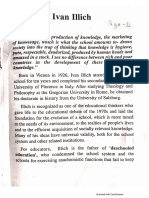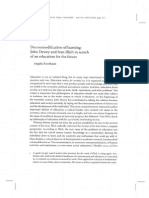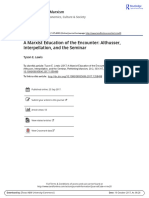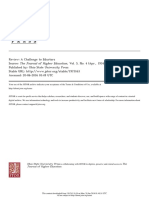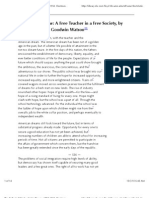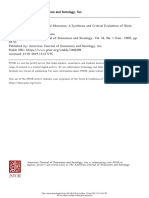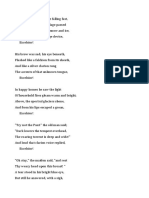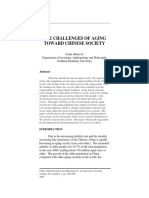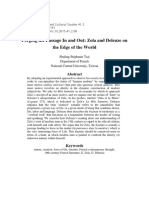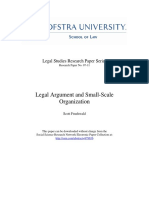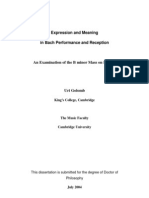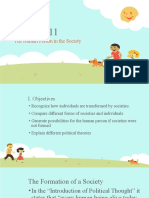Illich: Enemy of Schools or School Systems?
Author(s): Didier J. Piveteau
Source: The School Review, Vol. 82, No. 3 (May, 1974), pp. 393-411
Published by: The University of Chicago Press
Stable URL: https://www.jstor.org/stable/1084069
Accessed: 21-01-2019 11:12 UTC
JSTOR is a not-for-profit service that helps scholars, researchers, and students discover, use, and build upon a wide
range of content in a trusted digital archive. We use information technology and tools to increase productivity and
facilitate new forms of scholarship. For more information about JSTOR, please contact support@jstor.org.
Your use of the JSTOR archive indicates your acceptance of the Terms & Conditions of Use, available at
https://about.jstor.org/terms
The University of Chicago Press is collaborating with JSTOR to digitize, preserve and
extend access to The School Review
This content downloaded from 109.166.130.40 on Mon, 21 Jan 2019 11:12:12 UTC
All use subject to https://about.jstor.org/terms
�Illich: Enemy of Schools
or School Systems?
DIDIER J. PIVETEAU
Institut Catholique, Paris, and the University of Louvain, Bel
There may well exist somewhere an educationa
like its counterparts in politics and the arts, ta
to name a Man of the Year in Education. If so,
be tempted to name Ivan Illich its man of the
the sneers of those who asserted that his ideas would never
find a widespread hearing, people are talking about learn
exchanges, educational vouchers, and deschooling soci
Articles are appearing on the man and his work in popu
magazines and scholarly journals, and university seminars
studying the practical and theoretical value of his vario
concepts. As for me, I have been receiving from everywher
France requests for information about Illich's center at C
navaca. Quite in keeping with the personality of the man, t
Illich phenomenon has burst upon the world with the en
of a volcano or an earthquake.
Reactions to Illich
Reactions to Illich have been concerned with both his
personality and his theory, and have ranged from the p
and spontaneous to the scholarly and studied.
Among the more spontaneous reactions-those which
be encountered in casual conversation with educators-are
May 1974 393
This content downloaded from 109.166.130.40 on Mon, 21 Jan 2019 11:12:12 UTC
All use subject to https://about.jstor.org/terms
� Illich
four distinct types. (1) To some Illich is a deluded visionary
whose wild ideas show him to have lost all contact with reality.
To listen to his ideas might perhaps be a polite, even pleasant,
exercise, but to follow them would be madness. (2) To others,
paying homage to his fiery glance, his agitated and serious
visage, and his undeniably authentic way of expressing him-
self, he is a prophet or a mystic. They then add: "We need
mystics, sure, but not too many of them. We can't all be
prophets. Illich is an exceptional man." (3) To a third group
he is something of an agitator or wrongdoer. At a time when
everything is in turmoil and everyone is upset, to speak about
the schools the way he does is to do certain harm and to add to
the climate of pessimism and confusion. (4) To still others
Illich is a passing fad. They respond with an understanding
smile and wonder why so much is made of this new name.
They have seen this sort of thing before: every twenty years or
so a new theory appears out of nowhere and six months later
it is gone. And anyway, what is so new about his ideas?
One can recognize in these positions the not unfamiliar
results of certain types of fear: fear of dialogue and further
understanding, fear of uncovering even more disturbing im-
plications for the future. The four reactions constitute a
rejection of Illich by either dismissing or deforming his
personality or his theory. In the first three reactions, Illich is
called a madman, a mystic, and a malefactor. By qualifying
him in this way, one can banish him to asylum, paradise, or
prison, and thereby avoid having to live with him and his
disturbing ideas. The first three reactions marginalize Illich;
the fourth minimizes him. The result-rejection-is the same,
DIDIER J. PIVETEAU is professor of education at the Institut
Catholique in Paris and at the University of Louvain in
Belgium. He teaches with Ivan Illich during the winter term in
Cuernavaca, Mexico. He is also director of the Bureau
Pedagogique in Paris and editor of several journals and ser
of books on education. The article was translated from French
by J. T. Dillon, University of Chicago.
394 School Review
This content downloaded from 109.166.130.40 on Mon, 21 Jan 2019 11:12:12 UTC
All use subject to https://about.jstor.org/terms
� Didier J. Piveteau
but the method is different: incorporation rather than expul-
sion. The distasteful ideas are digested and assimilated but
end up reconstituted into a bland, deformed mass. In both
cases, whatever differences would make dialogue possible are
denied. In the first case the difference is exaggerated to the
furthest limits possible: "he's not one of us." In the second
case the difference is simply abolished and reduced to no-
thing: "he's just like all the others."
The reactions coming from more scholarly quarters, while
more subtle than the popular ones, are not sensibly different.
A measure of this similarity may be derived from the quality
of recent journal discussions on Illich.' Indeed, in one of its
most recent editorials, Esprit felt itself obliged to remind its
contributors-who have the reputation for rigorous
thinking-not to approach the subject in suits of armor plate
or ready to cast Illich's thought into ready-made, preformed
categories. Erich Fromm also pointed up this blind approach
to Illich on the part of intellectuals when he noted that
"Illich's writings have a stimulating force except for those who
know how to react only with anger to what they deem to be
foolish."2
One can only register surprise at the position certain
scholars have taken in view of the facts that the substance of
Illich's message has been communicated dozens of times
before by other writers, and his recommendations have al-
ready been taken seriously in numerous places. Many of
Illich's themes may be found in the writings of Sch6ffer,
Onimus, and Garaudy,3 while an Ontario Commission on
Post-Secondary Education recommends among others these
"alternatives in education": making educational facilities avail-
able to those who drop out of high school; giving preference
in hiring at all levels to those teachers who have had nonschool
employment experience; allowing workers to choose between
a salary increase and an educational program of their choice;
opening all libraries to all citizens without exception and
cataloguing all educational services in every city for immediate
access by all; and legal prohibition of employment discrimina-
tion based on attendance or nonattendance at a university or
other educational agency.4
May 1974 395
This content downloaded from 109.166.130.40 on Mon, 21 Jan 2019 11:12:12 UTC
All use subject to https://about.jstor.org/terms
� Illich
The Uniqueness of Illich
How does it happen that Illich excites such reactions and
fears when actually he enunciates ideas which have already
been stated and even put into practice? His uniqueness de-
rives, I think, from three characteristics: his intolerable lan-
guage, his present-day orientation, and his utterly lone and
authoritative voice.
His Intolerable Language
Illich has an extraordinary gift of language. He says exactly
the right things. While others probe here and there about the
wound, Illich puts his finger on the raw nerve. An excellent
example is his use of the phrase "deschooling society," a
phrase which more than any other arouses the cavils of his
readers. (When I speak of readers, I am perhaps being
optimistic, for many people have never gone further than the
title of the book, certain that the content will be quite what
they themselves would include under that rubric.) A certain
nominalism comes into play in this respect, and, interestingly
enough, scholarly critics as much as popular ones display an
unseemly haste to reject the word "deschool" in favor of
guarding the word "school." In a long response to Illich, J. W.
LaPierre writes:' "At issue here therefore is the question of a
different kind of school, not of abolishing all schools, not a
de-schooling [emphasis in original]" (p. 385). You see, you can
have anything you wish, provided that it be a school, even a
different school. Any reforms are permissible provided they
take place in school and that the continuity of the image be
assured by the word. But let a reformer propose to continue
doing what was in the past done in school, but to do it
elsewhere, in institutions which would no longer be "schools,"
and you would think the end of the world had come-rape,
revolution, and ruin.
A piquant example is the Catholic schools. Circumstances
oblige Catholic educators to run schools which today accomp-
lish very little of their original purpose. But no matter, they
will incorporate whatever activities and curricula are required
396 School Review
This content downloaded from 109.166.130.40 on Mon, 21 Jan 2019 11:12:12 UTC
All use subject to https://about.jstor.org/terms
� Didier J. Piveteau
of them because they can still guard the title of Catholic
school. Yet let someone propose to them to do that for which
Catholic schools were originally founded (religious instruction,
youth groups, etc.), but to do it outside the school, and cries of
scandal and betrayal go up. The shadow is taken for the
substance. In these conditions one is naturally led to ask
questions about the "essence" of the Catholic school
-questions which are asked only when there is no longer any
essence left. When the Catholic school was on the periphery of
the system, it had its essence and did not have to mount a
study to find it.
The influence of this nominalism may also be seen at work in
the processes of reasoning to a conclusion. Our present view
of scientific causality seems to lead us to think that changes in
human affairs must come about as the inevitable consequence
of changes in technology or other material matters. The
reverse sequence seems inadmissible. I have on several occa-
tions performed an interesting little experiment in this regard
while giving a lecture comprised of two points. On each
occasion the content of the lecture remains exactly the same
but the order of the points varies. In one variation, I speak of
the new developments in educational technology such as
cassette programs, computerized teaching, learner feedback
systems, cable and satellite television-all of which fascinate
the audience by their implications and prospects for the
future. I then explain that as a consequence the schools will
have to change, perhaps even disappear. This goes over well.
In another variation of the same lecture, I reverse the order of
the points. I begin by saying that the schools could be
abolished in their present form since they are outmoded and
are responsible for many of our present ills. Then, in the
second part, I say that the situation is, after all, not hopeless,
for we have the means to replace the schools, we have
alternatives to them (to use Illich's word), and I launch into
my recital of cassettes, computers, and the rest. Believe me
-or better yet, try it yourself next time-the second variation
does not go over at all well but engenders hostility and
rejection. To me this shows that in the first case the audience
imagines that despite everything the school of tomorrow will
May 1974 397
This content downloaded from 109.166.130.40 on Mon, 21 Jan 2019 11:12:12 UTC
All use subject to https://about.jstor.org/terms
� Illich
still be a school, and it is this belief which counts above all in
their eyes. Illich refuses to take such tactical precautions. He
prefers as more dignified the approach which would present
the technological changes as a consequence of the attitudinal
changes, rather than the reverse.
Here then is one of the principal causes of the irritation
which Illich causes. He does not say things as others say them;
he says them at a level which causes perturbation. His message
is more in his manner than in his content. As far as the
content goes, fine, we have gotten used to that; but th
manner is another thing and many find it intolerable.
His Present-Day Orientation
In the second place, Illich is irksome not so much becaus
he proclaims the woes of morrows to come as because he cal
today's spade a spade. He does not say, "Tomorrow the
schools are going to crumble" but rather, "The schools are
finished and you don't know it." He thus makes it impossib
for us to continue pursuing our ostrich strategy. Faced with a
man who predicts catastrophes to come, we are not withou
defenses: we can enlarge the time margin which he foresee
After all, the cataclysm predicted for 1980 might not com
until 1983. From that point on it might even become pleasan
to sit and visit with the visionary; one gets a bit of the thrill
and suspense of throwing dice, playing roulette, or flirtin
with adventure, all without personal stakes involved. That
why fortune-telling enjoys such success. But Illich is not
fortune-teller. He is a present-teller. He tells it like it really i
not like it possibly might turn out to be. And that is wha
explains the uneasiness which he arouses in so many peopl
His eyes are wide open and they stare unblinkingly at today
world. We can do nothing to minimize what he sees, since w
also feel that we see the same thing with our own eyes
Retiring into ourselves, we see that his critical diagnosis is true
By dint of cunning we do sometimes manage to hide the real,
but then along comes Illich who rips off the mask and th
tinsel to show us the school just as it is in front of us, here and
now. And following the line of his pointed finger we see that
398 School Review
This content downloaded from 109.166.130.40 on Mon, 21 Jan 2019 11:12:12 UTC
All use subject to https://about.jstor.org/terms
� Didier J. Piveteau
what he is showing us is a corpse. To have such a man with us
is intolerable. Illich does not play the game; he will not let us
sleep on.
His Lone and Authoritative Voice
What is yet more intolerable is that this voice comes from
Ivan Illich alone. In whose name does he speak? No one's. Of
what movement is he spokesman? None. "Once again Illich
has succeeded in making me uncomfortable. Why? There is
first of all his didactic tone and his solitary manner. His is a
manner of discoursing, brilliant and inspired, which you dare
not interrupt. Illich speaks in his own name and he addresses
himself to the powers that be."6 There without doubt, felt and
almost named, is the true and principal reason that Illich
makes so many waves; Most, if not all, of the authors who
write about the school belong to some party, group, or religion
which gives them a reference and even a refuge. They belong
to a national center of this or an international association of
that; they expatiate on ideas first emitted at a Genev
symposium or an Italian conference-all of which goes
make what they say less controversial and provoking, for if
entire group thinks that way, their message can be put in
some context and their voice can command some respect
Our age has forgotten how to listen to the lone voic
Psychoanalysis may well have taught us to speak more authen
tically, in the sense of being the author and master of o
words, yet we seem to mouth banalities and to command onl
our own circumscribed personal world of everyday thoug
But to be the source and master of one's own thought on
planetary scale, without using citations and references, with
feeling the need to quote Aristotle, Aquinas, Marx, o
Freud-there you have real impertinence, and there also y
have Ivan Illich. He appears on the scene representing no
but himself, fitting into no categories, supported by no part
aided by no pressure group. His books and articles are dev
of footnotes; he advances unarmed and unshielded by som
one else's thought. Is it vanity? Superficiality? Perhaps. At an
rate it is difficult for university scholars who have built th
May 1974 399
This content downloaded from 109.166.130.40 on Mon, 21 Jan 2019 11:12:12 UTC
All use subject to https://about.jstor.org/terms
� Illich
research on footnotes to accept an indictment of the university
unsupported by references, citations, and bibliographies.
If one judges by the results, a stance such as Illich assumes is
both fascinating and irritating. Fascinating, because such a
voice can seemingly not be forgotten; it pursues you, weaves in
and out of your path; you cannot leave it by the wayside to die
as you can with so many other, and more rational, theories.
But at the same time it is irritating, for you cannot carry on a
dialogue with it as you can with the others. The tone of this
voice is singular. It does not follow the rules of discourse to
which we have been accustomed. Can it be that our bad mood
secretly comes from the fact that this voice reminds us of an
abandoned ambition? Perhaps this tone of voice and this lo
type of stance are qualities which we ourselves would like
have but have long ago lost.
Illich's Educational Thought
We can specify three aspects of Illich's thoughts on educa
tion: (1) his diagnosis of the school system; (2) his call for
deschooling society; and (3) his program for remedial action
Diagnosis
Illich's diagnosis is simple and has been advanced dozens of
times in various countries and by authors of various intellec-
tual persuasions. It reduces to the following: the school system
is a charade in that it fails to produce what it promises; it
keeps those who succeed through it in a state of unthinking
admiration, while it contributes to maintaining the poor in a
reduced and subordinate status; and it is founded on some-
what questionable-or at least far from proven-conceptions
of learning, teaching, and child development. We must re-
examine the system from start to finish, abolish the separation
of childhood and adulthood, and begin to rely for our results
more upon the desires and interests of the learner than upon
compulsion and requirements.
In pursuing his diagnosis, Illich takes average account of the
statistical information available to everyone, and paints no
400 School Review
This content downloaded from 109.166.130.40 on Mon, 21 Jan 2019 11:12:12 UTC
All use subject to https://about.jstor.org/terms
� Didier J. Piveteau
bleaker picture of the system than do Coombs, Silberman,
Freire, Goodman, Friedenberg, or others. His specific con-
tribution in this area is probably best described as pedagogical.
One is more likely to recall and use the images he employs
-sacred cows, the new religion, the rites and rituals of the
institution of school-than to quote the weighty analyses of
other authors. Furthermore, Illich's attack on the system of
schooling is broader than others. His target is neither the
secondary school alone nor the university system: "The project
of demythologizing which I propose cannot be limited to the
university alone. . . . Only a generation which grows up
without obligatory schools will be able to recreate the univer-
sity" (p. 38).7
No one thinks seriously of casting doubt on Illich's analysis.
Note the number of sentences in various rebuttals of Illich
which begin with phrases such as "without doubt," "it is tru
that . . . ," "it cannot be disputed that . . . ," "most assuredly,"
or "certainly"-phrases which amount to concessions by which
the writers hope first to calm and caress the animal in order
better to slaughter it later.
Deschooling Society
This second element in Illich's contribution lies at the
juncture of the first point, diagnosis, and the third, reme
"Deschooling society" is such a striking phrase, one might say
it hits on the right (or wrong!) nerve so exactly that ma
people retain from Illich only this one aspect, this one phrase
In their eyes, Illich is the one who wants to deschool socie
From this ill-defined idea they quickly pass to that thoug
which for them is synonymous with it: Illich wants to sh
down the schools. What precisely does this word "deschooling
mean, a word which has the double effect of expressing Illich
thought so well and of causing so much trouble?
First we must clarify what it does not mean. And what
does not mean above all is that Illich wishes to close the
schools, say, next September. Indeed, one hears objections
this type in discussion: "Let him do it. And then what will w
do with the children once the schools are closed?" Having s
May 1974 401
This content downloaded from 109.166.130.40 on Mon, 21 Jan 2019 11:12:12 UTC
All use subject to https://about.jstor.org/terms
� Illich
this much, the objector turns away with a guffaw, as if with
this crushing argument he had gotten to the heart of the
matter and finished off this scatterbrain who does not know
what he is talking about. To attribute such negligent unaware
ness to Illich says a lot about those who impute such ideas
him and reflects more of a judgment on them than on Illic
This is not the meaning to give to the word deschooling, firs
because the word itself expresses an impossibility, and seco
because Illich has frequently taken pains to explain what h
means by it.
Let us first note that to deschool society cannot mean to
close down schools for the simple reason that there are no
longer any schools, there are only school systems. The nuance
is important. Certainly we have had schools throughout our
history. From time to time people on the margin of things
-Montessori, Decroly, Neill-have opened up a new school,
and these have been useful and beneficial institutions. But
they rapidly cease to be schools and become part of a s
system. Illich is not the enemy of the school but of the sc
system. The enemy of the school is not Illich but those
confound the two terms and labor to save the system, thi
to defend the school while they actually destroy it.
conceivable that in the type of society which Illich de
there would be even more schools than there are today
Illich himself has said that very thing on several occasi
Beyond these commonsense remarks, Illich's writings
vide the evidence of what he means by deschooling. He
his attack not at the school but at the school system, that
the school insofar as it partakes of a system, receiving from
system its definition, its norms, its rules, rites, and regula
His target is not the school considered as a place of app
ticeship, teaching, and learning, proceeding according to
negotiated wishes of the parties involved. He wishes to des
not the school based on free association and motivation but
the school system based on dictated obligation and compul
sion. To prove that this is indeed Illich's meaning, I will refer
not to conversations held in private with him, nor to docu
ments inaccessible to public readership, but only to his book
402 School Review
This content downloaded from 109.166.130.40 on Mon, 21 Jan 2019 11:12:12 UTC
All use subject to https://about.jstor.org/terms
� Didier J. Piveteau
Deschooling Society, which any of his critics could have ex-
amined.
The title of the first chapter tells the story: "Why We Must
Disestablish School." If one still entertains doubts as to what
Illich means by this expression, he has only to glance at t
title and content of chapter 4, "Institutional Spectrum." I
clear from this chapter that the word "school" does not re
to a particular place but rather to a hierarchical and str
tured organization, that is, a system. The subheadings
chapter 2, "Phenomenology of School," further demonstr
that it is never a question of criticizing teaching or what go
on in a particular place but only that which is determined
an all-embracing, ritualized system-"school age," "full-ti
attendance," "teacher-pupil distinction." In fact, Illich stat
"I shall define 'school' as the age-specific, teacher-rela
process requiring full-time attendance at an obligatory cu
riculum" (pp. 25-26).
The text of the chapters makes the meaning even mor
certain. On page 9 we read [emphasis added]: "[The system
obligatory schooling inevitably polarizes a society; it a
grades the nations of the world according to an internatio
caste system." And on page 11: "To make this disestablishmen
effective, we need a law forbidding discrimination in hiri
voting, or admission to centers of learning based on previ
attendance at some curriculum." This quotation is quite cle
Illich does want "centers of learning"-of course he fails to ca
them schools-and so that they may function in a better w
he wants them unhampered by the regulations of a scho
institution. "There is a lack of cogent argument and of matu
leadership aiming at the disestablishment of any and
institutions which serve the purpose of compulsory lear
ing. ... This is especially surprising in a time of growi
though chaotic, resistance to all forms of institutionally plan
ned instruction on the part of those aged twelve to seventee
(p. 69). Illich shows why he is against the institution, evok
as its final state the irrational and sinister bureaucracies
described by Kafka and Koestler and recognizable in
parts of our everyday life. We may already have fallen
May 1974 403
This content downloaded from 109.166.130.40 on Mon, 21 Jan 2019 11:12:12 UTC
All use subject to https://about.jstor.org/terms
� Illich
absurd Kafkaesque world. "The movement of our society
from the present-in which all institutions gravitate toward
postindustrial bureaucracy-to a future of postindustrial
conviviality-in which the intensity of action would prevail
over production-must begin with a renewal of style in the
social institutions-and, first of all, with a renewal of educa-
tion" (p. 64). Numerous other citations could be given, all
from a book which Illich's detractors must have read. When
one thinks that the profession of most of these critics is the
study of written texts, one winces and is tempted to lend some
force to Illich's remarks on the failure of the present univer-
sity.
But there is another aspect to all of this, comic or tragic
according to one's point of view. I have had occasion to say
orally what I have just written, only to hear the reply: "Why
doesn't Illich himself make the points you've just made? Why
does he use a word which doesn't have the meaning people
naturally attribute to it? Do you mean to say that when
someone hears the word, he has to go read the book to find
out what it means?" When I hear this I think I must be
dreaming. Only the laughter of 1,000 massed clowns coul
equal the volume of bad faith behind those remarks. Is it n
precisely the role of rich and unique phrases to stimulate
study and research? There even exists a special field of stu
consecrated to this activity, called hermeneutics or exeges
Do not Communists have to explain the concept of "cla
struggle" in order to calm their young neophytes who feel th
urge to kill when the boss gives them orders on the job? Does
the devout Catholic just naturally believe that "papal i
fallibility" means the pope cannot make a mistake? A hun
dred years after the launching of these two concepts peop
still have to read article after article to grasp their mean
ing, to learn what sense to give to them under what cond
tions and in what circumstances. Was there then no poin
or no necessity to their having been created in the first place
We live in a world of exegesis because we live in a world
language. To ask of Illich what we do not ask of our politi
and religious leaders is to show manifest bad faith.
404 School Review
This content downloaded from 109.166.130.40 on Mon, 21 Jan 2019 11:12:12 UTC
All use subject to https://about.jstor.org/terms
� Didier J. Piveteau
In his discussion of deschooling Illich makes three points
which we would do well to remember.
To deschool society does not mean to close all the sch
tomorrow, but rather to disestablish the school system.
This disestablishment of schools is already at hand. It is le
a question of fighting against the system than it is one of
system's crumbling from within. It is already swaying and
topple of itself, with perhaps a slight push from the yo
And they are pushing.
The remaining task is to try to orient the deschooled soci
in a hopeful direction. It is not at all certain that the direc
which a deschooled society will take will entail any m
dangers or problems than we have now in our "scho
society." On this point Illich is quite explicit and insisten
much so that it is difficult to comprehend how some critics
attack him on the basis of the uncertainty of the future w
he describes. Illich knows better than his critics do the uncer-
tainty involved, and he is frank enough to state it, which i
rare: "Deschooling, which we cannot stop, could mean th
advent of a 'brave new world' dominated by well-intentioned
administrators of programmed instruction" (p. 103).
Remedy: Learning Networks
This third element in Illich's thought comprises the action
program for the future, the remedy proposed after th
preceding diagnosis and analysis. It should be clear from th
reading of the passages cited that these proposals do no
constitute the heart of his message. It is a bit disingenuous to
reject Illich's contribution on the basis of his proposals for the
future. On the one hand, the learning webs, networks, or
opportunities which he recommends in chapter 6-referenc
services, skill exchanges, peer matching-are not fundamen
tally different from the various information-storage and re
trieval systems proposed by communication scientists and
specialists. And on the other hand Illich has no other ambition
than to provide a platform for discussion and reflection,
place where all who work on these problems might gather t
discuss, improve, and, where needed, dismantle his model i
May 1974 405
This content downloaded from 109.166.130.40 on Mon, 21 Jan 2019 11:12:12 UTC
All use subject to https://about.jstor.org/terms
� Illich
order to build a new and better one. Fidelity to Illich does not
involve a blissful acceptance of all his suggestions. Illich
himself would be the first to be aggrieved at the sight of
people accepting his ideas wholly and uncritically. To do so
would be to reconstruct on his home ground the very thing
which he has taught us to destroy in other areas: the mindless
submission to all manner of established institutions and modes
of thought.
Dissents
My thinking differs from that of Illich in that he passes
without transition from the present to the future and that his
use of the word school is never qualified by terms such as
primary, secondary, French, American, Mexican. These two
elements in his thought lead me to say that in order to apply
Illich's analysis to the present situation one ought to consider
these points.
1. A distinction must be made between elementary and
postelementary schooling. I personally believe in elementary
schooling, that is, in a process by which children are brought
together into one place, socialized in the presence of adults,
and inducted into social habits and language. I do not at all
believe in secondary schooling nor in compulsory schooling to
age sixteen or eighteen. As for the intermediate junior-high
level, I have not yet reached any firm conclusions.
2. It is unthinkable that in the immediate future there
should be no teachers. That would only provoke uncons
ble problems for human affairs. I do believe in the w
teachers can accomplish, but teaching for most people c
constitute the whole of human life. I think it unwise to
prepare young people only for teaching. We ought to
teacher education programs which in effect bear no
teaching but on other professional activities, in orde
whether they are more useful than strictly professional
education programs.
3. It is unthinkable to drop all examinations tomor
examination is a form of evaluation at a certain given p
406 School Review
This content downloaded from 109.166.130.40 on Mon, 21 Jan 2019 11:12:12 UTC
All use subject to https://about.jstor.org/terms
� Didier J. Piveteau
time, and I believe in such. I do not believe in transforming
exams into diplomas, a lasting privilege of automatic access to
positions and salaries. Professional performance ought to
remain subject to assessment. Anyone who is so inclined may
get on a scale and have his weight recorded. But that in no
way gives him the right to take up two seats on the train on the
pretext that once upon a time he weighed in at 300 pounds!
The Price of Change
The most serious misunderstanding of Illich's views on the
future would be to read his message as applying only to the
field of education. Here again we see the most pronounced
intolerance to the evolution of his thought. Many people
cannot understand why Illich does not limit himself to the role
of educational reformer but sets himself to studying problems
of technology, pollution, urban planning, or the consumer
society. Yet these same critics characterize his educational
plans as utopic, unrealistic, and unworkable, given our present
society. Might not this game of hide-and-seek reflect a deeper
opposition to Illich, stemming from a personality disposition
or attitude against change? Here I think we come upon the
touchstone of the various reactions to Illich's thought.
Those who read or hear Illich respond to him less in terms
of what he means for education than in terms of their own
stance regarding change. It is not true that the majorit
people want to change. Many use the rhetoric of change
do not accept the fact of change. People want the "n
society," provided that it is not different from the old
They want the "new school," but not for the "new" so much
for the "school." Continuity here is stronger than nove
They want the "free school" provided that it be above all fr
to do just as the unfree schools do. They want the revolu
or the new administration promised by political parties
cause revolution generally accomplishes no fundamen
change. Rather it transfers power from one group of per
to another, while those in the society who have never had a
to start with fail to gain much more of it. To admit the des
May 1974 407
This content downloaded from 109.166.130.40 on Mon, 21 Jan 2019 11:12:12 UTC
All use subject to https://about.jstor.org/terms
� Illich
not to change, to proclaim the wish to keep things-and one's
self-nicely as they are, might not be praiseworthy, but it is at
least not unvirtuous. But to hide such a strong motive behind
an array of so-called technical reasons against the possibility of
change is a work of rationalization which is unworthy of those
who are charged with some responsibility in human affairs.
One of the most frequent of these rationalizations is that if
children are not in school they will not learn anything. If one
replies that less than 10 percent of what children know has
been learned in school, the objectors take another tack and say
that the things which children learn outside of school are not
properly absorbed, organized, or valuable. I should like to
comment on the last of these retorts. While re-reading my
literary history a few months ago, I was struck by the great
number of authors studied in French literature courses who
wrote of their dissatisfaction with the schools they had at-
tended. Indeed, some had been thrown out of school, while
others, contrary to the pious impression of their parents back
home, spent their time frequenting the tavern rather than the
library and chasing skirts instead of footnotes. One thinks of
Villon, Rabelais, Racine, Rousseau, Musset, Rimbaud, LaFon-
taine, and others too numerous to mention. Many of them
managed to succeed not because of the school but apart from
the school and sometimes in spite of the school. It is a paradox
that the school today is a system in which children are
required to study the works of authors who were only success-
ful because they did not submit to that very same system.8
Rousseau is a splendid example. Here is a man who exhausted
himself throughout a great part of his life in an attack upon
schools, classes, and textbooks. And what does an admiring
and grateful society now do in order to demonstrate its
interest in his message? It can think of nothing better than to
set up schools in which teachers explain to their young charges
that certain great minds found the schools nefarious; to
publish books in which our youth are required to read of the
happiness which Emile experienced while living in freedom;
and to ask degree candidates to prepare dissertations-on
which they may fail, by the way-comparing the ideas of
Rabelais, Montaigne, and Rousseau-writers who were
408 School Review
This content downloaded from 109.166.130.40 on Mon, 21 Jan 2019 11:12:12 UTC
All use subject to https://about.jstor.org/terms
� Didier J. Piveteau
unanimous on one single point only: to do away with the
school.
Here is where Illich's honesty comes to bear-in telling us
that there is no substantial educational improvement without
substantive institutional change. Illich plays no games. He
proclaims the urgency of deschooling society precisely in
order to free the future, for the function of the school system
has been, in effect, to manacle the future.9 To make truly
meaningful changes to remedy the injustices and dysfunctions
recognized by everyone as inherent in the present system, we
must attempt to change not only the means we are using but
also our ends.
The Refusal of Inhumanity
The meaning of Illich's contribution is that he forces peop
to rethink where they stand with regard to the system
institution of school. We are forced to reshuffle our scholastic
cards, as it were. Illich's actions are intended to have no other
effect. His role is to analyze, expose, and catalyze. In our ow
day there have existed unknown to each other whole com-
munities of thought and aspiration, whole networks of like
minded people separated by traditional geographical splits in
politics, religion, and science. Illich has uncovered and rallie
them. The books, articles, and documents coming out o
Cuernavaca may be likened to the emission of an infrared
light under which new sociological configurations may be seen
to appear, no longer defined by the strife and alliances of the
past, but by hopes for the future. Illich counts among his
disciples both Christians and Communists, citizens of rich
countries and poor, of major powers and of the Third World
His message has already transcended ancient boundaries
redistributed old groupings, and changed the rules of the
game in politics, education, and social action.
The camp of Illich's opponents in the last analysis is made
up of those who say yes to a situation which they can somehow
judge compatible with human dignity, though their yes is
followed by half-hearted ifs, ands, and buts. The camp of
May 1974 409
This content downloaded from 109.166.130.40 on Mon, 21 Jan 2019 11:12:12 UTC
All use subject to https://about.jstor.org/terms
� Illich
Illich's proponents, on the other hand, is made up of those
who choose to say no to such a situation: a no which is
completely spontaneous and which irresistibly emerges in the
face of a situation which is felt to be inhuman; it is an
unqualified non possumus.
We will always need voices which can claim attention a
clamor "No!" Without these voices, it is only too certain t
we shall all quickly fall into slumber. Reform comes about on
because revolution is demanded: to get a little you have t
demand a lot. It is a question of tactics.
I am writing these lines on the campus of Notre Dam
University, where the harmony of lawns, trees, and building
is of such perfection that the flesh is fairly wounded by
beauty and the spirit feels an intense need for permanenc
How I wish that this world would endure! And yet, less th
two miles away I know of neighborhoods with children w
will never even suspect the existence of such subtle beauty
may be found in these cultural retreats. I often find myself
practical disagreement with Illich on the short-term measure
to take toward the solution of such problems, and I believe t
moment has come when each group will elaborate its own
strategy for action. I do not know what shape education w
take in the future. But one thing is certain. Illich is one
those who has retaught us to say no to the inhuman conditio
around us today.
410 School Review
This content downloaded from 109.166.130.40 on Mon, 21 Jan 2019 11:12:12 UTC
All use subject to https://about.jstor.org/terms
� Didier J. Piveteau
1. See the special issue, "Illich en debat," Esprit 40 (March 1972):
321-408; H. Gintis, "Critique de l'Illichisme," Temps modernes
(September/October 1972), pp. 525-57; Cahiers pedagogiques, vol. 109 (De-
cember 1972). (Here, as throughout the entire text, where the discussion
bears principally on matters unfamiliar to English readers, the author's
original version has been greatly shortened and numerous citations, allu-
sions, and references have been omitted altogether.-TRANS.)
2. Erich Fromm, "Foreword," in Ivan D. Illich, Celebration of Awareness
(Garden City, N.Y.: Doubleday, 1970).
3. N. Schoffer, La ville cybernitique (Paris: Denoel, 1971); J. Onimus,
L'asphyxie et le cri (Paris: Desclee De Brouwer, 1971); R. Garaudy,
L'alternative: Changer le monde et la vie (Paris: Laffont, 1972).
4. Province of Ontario, Commission on Post-Secondary Education,
Report (Toronto: 1971), pp. 3-33.
5. J. W. LaPierre, "Discussion," Esprit 40 (March 1972): 382-93.
6. Y. Goussault, "Discussion," ibid., pp. 379-80.
7. Ivan Illich, Deschooling Society (New York: Harper & Row, 1970) (For
this translation, quotations have been taken from the English edition rather
than from the French cited by the author. Due to certain differences, the
English version quoted here may in some instances not reflect perfectly the
author's purpose in the context of his discussion.-TRANS.)
8. (American readers will find more familiar parallels in the schooling
of Cooper, Hawthorne, and Fitzgerald, among others [see E. Hattam, "The
School Days of Our Novelists: The Case for Creativity," Teachers College
Record 69 (1968): 459-64].-TRANS.)
9. (The author's meaning here derives from the French titles of Illich's
books, La societe sans &cole and Liberer l'avenir.-TRANS.)
May 1974 411
This content downloaded from 109.166.130.40 on Mon, 21 Jan 2019 11:12:12 UTC
All use subject to https://about.jstor.org/terms





